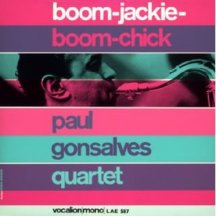 Boom-Jackie-Boom-Chick Vocalion LAE 587 MONO Recorded 1962, Switzerland |
Personnel
Paul Gonsalves - Tenor Saxophone Jack Sharpe - Tenor Saxophone Pat Smythe - Piano Kenny Napper - Bass Ronnie Stevenson - Drums |
Track Listing
1. Boom-Jackie-Boom-Chick (Gonsalves) 2. I Should Care (Cahn, Weston & Stordahl) 3. Village Blues (Coltrane) 4. If I Should Lose You (Robin & Rainger) 5. Poor Butterfly (Hubbell, Golden & Burnside) 6. Blue P.G. (Gonsalves) 7. You Are Too Beuatiful (Rodgers & Hart) 8. Taboo (Lecuona, Stillma & Russell) |
Paul Gonsalves, tenor saxophonist, and long-term member of the Duke Ellington Orchestra. Has been with the band for fourteen years, during which time has forged himself a personal niche in the Ellington Hall of Fame. A musician with a completely personal tone and method of approach, he is a most lyric player of ballads, but can also play hard swing with the best and toughest of them.
Pianist Pat Smythe is a Scot by birth who originally trained for the bar. Was for some time, resident pianist at the Downbeat Club, and has since then been playing with Joe Harriott. He favours the more modern pianists, such as Bill Evans and Tommy Flanagan—his favourite saxophonist being, funnily enough, Paul Gonsalves.
Kenny Napper is generally classed as Britain's top bass player. A member of the Johnny Dankworth Orchestra, he also does a deal of arranging and provides the backing for all the Roy Castle sessions. His playing has been much admired by all the-visiting Americans who have had a chance to hear him play.
Ronnie Stevenson is recognised as one of Britain's best young drummers. Was with Johnny Dankworth for some time, and is now with Jack Parnell, and also plays at the Ronnie Scott Club. His rise to fame could truly be called meteoric for almost within weeks he attained the big time, after playing for but a' short while in Don Smith's Palais Band.
THE MUSIC
It was during the bad winter of 1962-63 that some British musicians on a short break from club routine, met up with Duke Ellington's famous tenor saxophonist Paul Gonsalves in Switzerland. Maybe just to get out of the cold, or maybe because they all had that companionable feeling towards the music they play, but whatever the reason was, the result was a musical get-together in a local, warm, recording studio.
Nothing was preconceived, nothing arranged beforehand. The British group were all staunch admirers of the Gonsalves brand of jazz, and he, a jazz musician from the top of his head to the soles of his feet, was only too pleased for the chance of a blow, almost before that legendary hat reached the floor.
The tunes were all natural choices—-even the two original “compositions” from Gonsalves. What more natural than a blues, and what more natural than its simple title P.G. Blues? The other original was a catchy melody which had been jumping around in Paul's head for quite some while. Boom-Jackie-Boom-Chick, a snappily rhythmic title, has more than a suggestion of the Latin-American timbre about it. The Jackie part of the title alludes to Paul's pal, club-owner, musician and fight-fan Jackie Sharp. The Boom is the beat and as for the Chick part, well your guessis as good as mine.
If I Should Lose You was chosen as the tune which brought to mind, for all the musicians present, the most positive picture of the late Charlie “Yardbird” Parker. If the Gonsalves version of this lovely theme is not quite so definite as the Parker version, then he surely gets as near to it as is humanly possible.
I Should Care was Paul's own choice for a ballad with body, and it shows off his playing at its lyrical best. It was not so long ago that I happened to be backstage in company with jazz impressario, Norman Granz, listening to an Ellington concert. Paul Gonsalves was in the middle of a solo feature when Norman remarked to me what a surprising musician Paul was—surprising in that he would start to play a phrase in the Lester Young fashion, and then just as the listener thought he knew what was to follow, Paul would throw you completely by playing something entirely different. This is a track which bears out Norman Granz's theory to the fullest extent.
As the last track was Paul's choice, the next one Village Blues was Pat Smythe's. Long a fervent admirer of John Coltrane, Pat suggested this Coltrane original, as he had always wanted to hear just how this blues would sound fashioned by the Gonsalves method. To make up the voicing that Paul thought this number required another tenor was added for this track. A bystander who happened to be in the studio was used, no one knew his name - but all the boys agreed that he was indeed a real “sharp cat”ull Ó, if they ever heard one. He is to be heard again for a fleeting second on the final bars of You Are Too Beautiful.
Poor Butterfly was the united choice of the entire British group present. Having heard the Ellington version of this tune on the LP entitled Bal Masque, which contains an outstanding but all too short passage from Gonsalves, they all agreed that he should be given the chance to stretch out and show what he could really do to this pretty tune. The experiment was a decided success, for this is undoubtedly a standout version of a beautiful melody.
And so finally Taboo. During the last war Paul Gonsalves had been in the Army and had seen service in the Far East. The Eastern music he had heard during that period had evidently fallen on fallow ground, had remained with him and taken root. The motif he plays here is very Eastern in tonal quality. It is, I think, one of the most beautiful things this great saxophonist has ever played.
Sinclair Traill 1964, Vogue Records Ltd., London.